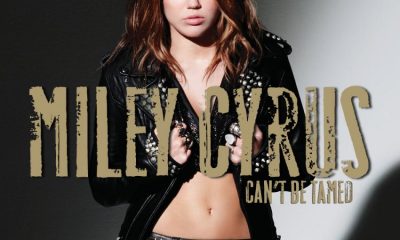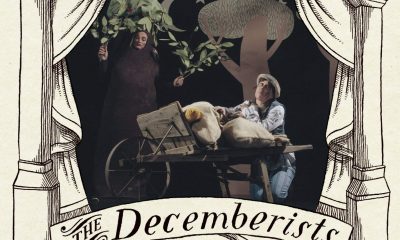Columns
Poet Taylor Mali Plagiarized by Country Writers
Country songwriters Brad Wolf and Donald Goodman (who penned Alabama’s “Angels Among Us”) copied parts of Mali’s well-known poem “What Teachers Make.”

Poet, voiceover artist and school teacher Taylor Mali is no stranger to having his work used without permission. His most well-known poem, “What Teachers Make,” has been making the rounds as a chain email for the better part of a decade. The poem was transformed, without consent or compensation, into a children’s book. And it was cited by New York Times columnist Thomas L. Friedman during a 2003 Yale commencement address. In each case, the poem was said to be the work of an anonymous author.
Friedman eventually acknowledged his mistake, and the author of the children’s book learned of the source material’s origin just in time to have a “Based on the poem by…” message added prior to printing. But for Mali, it’s the emails — whose senders sometimes have the audacity to re-write poem — that bother him the most. Written in 1999, “What Teachers Make” has been consistently credited to Anonymous despite the fact that there are many videos of Mali performing it online. One is from a 2003 appearance on the award-winning HBO special Russell Simmons Presents Def Poetry. Another is a YouTube clip with over a million views. There’s even a Ted Talk.
“Five minutes of searching for a phrase or two on Google would reveal I’m the author,” Mali said.
The plagiarism started when Mali published the poem on his website, TaylorMali.com, back in 1999. He said he didn’t include his name with the poem because he assumed the website address made it obvious who the author was.
Given how frequently he’s been plagiarized, Mali wasn’t shocked to receive my call about an unattributed use of his work. He was surprised, however, when he learned that the poem had been appropriated and transformed into a song currently being marketed to mainstream country radio — a process that requires the involvement and oversight of numerous people, from musicians and engineers to publishers and record label executives.
“I Make A Difference,” which is being offered to radio stations by an Atlanta-based company operating under the name Evergreen Records, can be streamed on the radio industry website AllAccess.com. The entry for the song in the database of Broadcast Music Inc., a performance rights organization that tracks and collects royalties owed to songwriters and music publishers, lists the writers as Brad Wolf (the artist) and Donald Goodman (who wrote Alabama’s “Angels Among Us” and Blake Shelton’s “Ol’ Red”).
In general, it’s a violation of U.S. copyright law to adapt an author’s work without their permission. While there are slight differences between the poem and the song, the chorus and second verse of “I Make a Difference” are almost identical to Mali’s “What Teachers Make.”
Wolf, Goodman and Evergreen Records did not respond to requests for comment. However, Robert “Buddy” Resnik, whose Resnik Music Group controls the publishing rights to “I Make A Difference,” said that he was unaware of any similarities between the song and poem.
“You kind of caught me off guard,” he said.
When asked what steps he planned to take as a result of being made aware of the issue, Resnik said that his company is “very honest and open, and committed to doing the right thing.”
In addition to Wolf’s version of “I Make a Difference,” a streaming audio player on Resnik Music Group’s website features versions of the song performed by Linda Davis (known for “Does He Love You,” her Grammy-winning 1993 duet with Reba McEntire) and a duo named Burns & Poe. Neither Davis nor representatives from Burns & Poe responded to my requests to comment for this story.
Resnik said that he doesn’t believe the song has been recorded by any other artists.
While the song has failed to garner any significant radio airplay, it’s available for streaming on Spotify, Apple Music and elsewhere. Mali is likely entitled to some or all of the royalties generated when people listen to the song on those services.
Mali said that he’s surprised by the lack of research conducted by Wolf and Goodman, and that he will likely issue a “cease and desist” letter to the appropriate parties.
“A part of me is honored that my poem moved someone to set it to music,” he said. “But the rest of me is disappointed that someone claimed my words as their own. I mean, the poem is a tribute to teachers. But you can’t claim to stand for that if you are also plagiarizing the words of a teacher.”
Mali said that if Wolf and Goodman had asked him first, he would have given them permission to adapt the poem — if they gave him appropriate credit in return.
Now, he hopes that any attention generated by this story will help him reattach his name to a poem that many people assume was written by no one in particular.
- Lists13 years ago
Top 10 Country Music Albums of 2010

 Interviews5 years ago
Interviews5 years agoJohn Rich – The Interview

 Song Reviews16 years ago
Song Reviews16 years agoTaylor Swift – “Love Story”

 Interviews5 years ago
Interviews5 years agoHoneyhoney on Hiatus: Revisit our 2008 Interview with Suzanne Santo

 Album Reviews14 years ago
Album Reviews14 years agoAlbum Review: Miley Cyrus – Can’t Be Tamed

 Song Reviews6 years ago
Song Reviews6 years agoThe Band Perry – “Hip To My Heart”

 Columns5 years ago
Columns5 years agoThe Link Between Folk Music’s Past and Present

 Columns5 years ago
Columns5 years agoIs Marketing Killing Rock and Roll?

